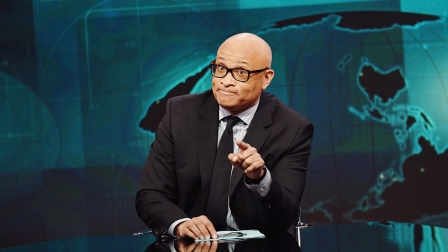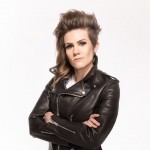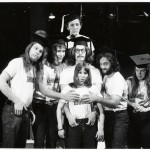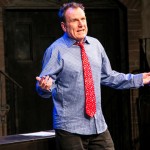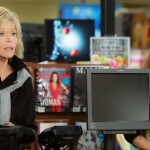Larry Wilmore: Comedy Central Wouldn’t Promote “Nightly Show” The Right Way
Larry Wilmore has always “kept it 100.” So when I reached out to get his response to Comedy Central’s abrupt cancellation of The Nightly Show after only a year and a half on the air (and right before the height of the presidential election), it seemed pretty likely that he’d do the same.
It’s true that The Nightly Show struggled with ratings—this year, its numbers dipped to less than half of the 1.7 million viewers that his predecessor, Stephen Colbert, averaged during his last year in the 11:30 p.m. slot. But the sharp-tongued comedian amassed hardcore fans by never relenting on his commitment to keep the thorniest social issues facing the U.S.—police brutality, rape culture, the origins of the War on Drugs—front and center on mainstream, late-night TV when few others would. (And with the type of sardonic exasperation that only he could pull off.)
When I interviewed Wilmore for Fast Company’s Most Creative People issue last year, Nightly had just debuted to rave reviews. I asked the entertainer, who’s had a prolific career in the business, the lesson he learned when Fox ousted him from the Emmy-winning Bernie Mac Show, which he created and produced. “Not everybody’s gonna get your vision,” he responded. “Even if you get fired, you left a record of what you wanted to do.”
Below, his thoughts on Nightly.
Fast Company: I know you just finished taping the show and are tired, so I’m just gonna jump right in. What happened?
Larry Wilmore: Uh, we got canceled. Maybe you weren’t paying attention to what a brotha said last night. But the brotha got canceled.
Yes, I saw. But you said in a statement that you were “surprised.” Why were you surprised?
Well, no one had informed me beforehand. I think it’s proper to be surprised. [Laughs] It wasn’t like they said it and I went, “Guys, look at this. I wrote this down (August 30, 2016), I predicted it. You were right, congratulations gentlemen. You have given me the correct answer!”
Look, I thought…absolutely, there was a chance we would not be renewed for a third season. But this season ends at the end of the year, so I thought, at least we’ll get the chance to cover the election, no matter what happens. So what I was really surprised about was that we didn’t get the chance to cover the election. I mean, it’s television, so you always live in the thought that your show might leave at any time. When it leaves is the surprise part. [Laughs]
It’s like that great Rod Serling line from The Twilight Zone. He said, “Every man is sentenced to death. Time and date of execution unknown.” That’s television. Every television show is sentenced to death, time and date of execution unknown.
[Comedy Central president] Kent Alterman said that the timing of the cancellation had something to do with the terms of your contract. Is that not true?
That’s what they said, so it must be true.
When Jon Stewart and Stephen Colbert left, Comedy Central replaced its two biggest stars, who are white, with two black men, you and Trevor Noah. Your show just got canceled, and this is the first time in 16 years that The Daily Show wasn’t nominated for an Emmy. What do you think that says about America’s viewing preferences?
I don’t know if I could make that general of a statement. We have so many fans from all walks of life and different ages. You never know in TV—sometimes you’re on at the wrong time at the wrong place. Sometimes you don’t get a chance to catch on. I think this is more of a statement about television.
What do you think it says about television?
That you just never know. A lot of television is luck of the draw. And look, what your show is makes a big difference, too. There was a lot of attention on us, and we were following in the shadow of a different show, as opposed to just being who we were. If we had [launched] on a different place, no one would have been comparing us to The Colbert Report right away. [People were saying,] “Well it’s not the Colbert show, it’s not the Colbert show.” Of course! That’s the point. [Laughs] It’s. Not. The Colbert show.
So those are tough shoes to fill. Stephen’s having a hard time filling them himself, his own shoes.
The last time we talked, we discussed your unique style of finding humor in topics that are tough to talk about. But, to me, if John Oliver goes on a rant about Brexit, it’s applauded and promoted. If Samantha Bee goes on a screed about Donald Trump—which was awesome—it goes viral. To quote one of your popular segments, are viewers just not ready to “Keep It 100” about race?
Uh…you said it. Am I disagreeing with you? No.
Well, I didn’t say it. I’m asking you.
I don’t know. It depends. Sometimes they are. But, are they ready to do that all the time in late-night [TV]? I don’t know, it’s hard to say. Race is not the easiest subject to make jokes about, and make commentary about, and we really tried our best.
And many times some of those things actually did go viral and really did catch on. We had many examples of that. I remember when we talked about the Walter Scott shooting, and I interviewed the [rival gang members] at a diner in Baltimore [because they had called a truce during the unrest].
Look, we really took a big hit when Jon Stewart left The Daily Show. That was a huge lead-in loss. You know, it takes some time to recover from that and gain viewers.
You thanked Jon in a statement after the news broke…
I did not mean it. [Laughs]
I don’t believe that. You credited him with encouraging you to do The Nightly Show. What did he say to you when he found out?
Oh, he was devastated, too. He was angry. He was not a happy camper.
You’ve gotten an outpouring of support on Twitter. [MSNBC news host] Lawrence O’Donnell tweeted, “Larry Wilmore always teaches me something I didn’t know.”
Oh that was nice. Lawrence O’Donnell said that?
Yep. How have your Comedy Central colleagues reacted to the news?
Umm…Comedy Central colleagues, meaning…
People you don’t work directly with on show—not contributors or regular guests.
Well, I’ve heard from so many people in the industry, friends and colleagues, who’ve been very supportive. It’s very comforting. It makes you feel like, okay, well you did something worthwhile.
Do you think Comedy Central promoted your show as much as it should have?
No.
What makes you say that?
I think they were interested in the launch of The Daily Show. And rightly so. I don’t blame them for that. Jon leaving was a big deal, you know. And I just think they put most of their energies over there. That’s my opinion.
What could have been done differently to make sure people watched?
I think we should have had more synergy between the two shows. I even told the network this. Trevor and I should have had on-air connections, the way Jon and Stephen did. It would have been fun to do hand-offs and that type of thing. Just for people to see that there’s a distinction—[all] black people just aren’t the same. Here’s a guy from South Africa, for goodness sake. I grew up in California, you know? I’m an African-American, he’s an African-African. We could’ve really had fun playing on those differences. People would have known why our points of view are different. [Otherwise] it’s like, “Oh, another black guy is coming on to tell me this same stuff? Sorry, goodbye.”
What was the hesitance to show that synergy?
I don’t know; you’ll have to ask them. That was just my suggestion, but you know, I don’t work at the network.
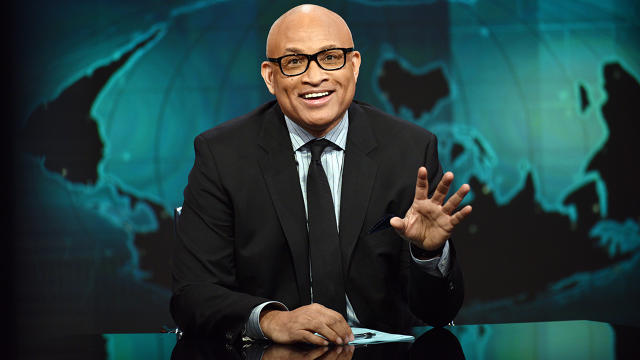
You had a sort of hard-hitting presentation as host of the White House Correspondents’ Dinner, where you referred to President Obama as “my nigga.”
Whaaat? I did not. Wait, is that what I said? Because I blacked out as I was saying it. I have no memory of what happened at the White House dinner. I’ll take your word for it, but it does not sound like something that I would ever say. To the president? Come on, man.
Do you think that turned off some viewers?
No, we didn’t lose any viewers after that.
What was the reaction internally from…
People loved that! Look, no. People who like our show loved that. We didn’t lose any fans after I did that dinner. It would be nice to think that something on C-SPAN affected our viewership. I mean, I would love to think that was the case. Or as I said at the dinner, “HDMI—No Input.” That’s what C-SPAN is competing with. Give me a break.
Have you been asked to do anything else at Comedy Central?
Well, they just fired me, so that’s probably unlikely.
I saw the pilot for HBO’s Insecure, which you are producing with its star, Issa Rae. Other than that, what else are you working on? What’s next after this?
Well, you know, so this just happened. I have a couple of ideas for things I’d like to do, but I’ll just kind of take my time with it, enjoy the launch of Issa’s show, and see what’s next. But I’ll definitely get back into storytelling. You know, half-hour, maybe movies.
What do you have planned for your last show on Thursday?
I think it’s gonna be pretty simple. I think I’ll have a guest come on for a quick interview, have all of the contributors out. I think we’re gonna show some of our favorite moments. Just kind of have some fun.
What’s your favorite moment?
My favorite moment came on the second episode, the first time we brought up the Cosby thing. And it was in the intro. And I said, “And tonight, we will ask the question, ‘Did he do it?’” And then I said: “And the answer will be, ‘Yes.’ [Laughs]
Because to me it’s like, yes! We are not afraid to tell you exactly how we feel about this. We’re not holding back, we’re not being coy. This is what “Keeping It 100” is all about. We came out of the chute with that, and we never shied away from it.
Fast Company , Read Full Story
(30)

